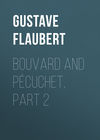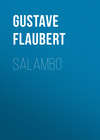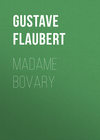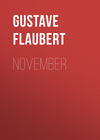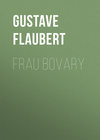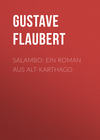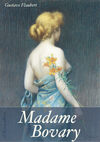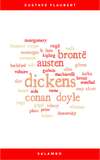Buch lesen: «Bouvard and Pécuchet, part 2», Seite 6
THE DANCE OF DEATH
(1838)
“Many words for few things!”
“Death ends all; judgment comes to all.”
[This work may be called a prose poem. It is impregnated with the spirit of romanticism, which at the time of writing had a temporary but powerful hold on the mind of Gustave Flaubert.]
Death Speaks
AT NIGHT, in winter, when the snowflakes fall slowly from heaven like great white tears, I raise my voice; its resonance thrills the cypress trees and makes them bud anew.
I pause an instant in my swift course over earth; throw myself down among cold tombs; and, while dark-plumaged birds rise suddenly in terror from my side, while the dead slumber peacefully, while cypress branches droop low o’er my head, while all around me weeps or lies in deep repose, my burning eyes rest on the great white clouds, gigantic winding-sheets, unrolling their slow length across the face of heaven.
How many nights, and years, and ages have I journeyed thus! A witness of the universal birth and of a like decay! Innumerable are the generations I have garnered with my scythe. Like God, I am eternal! The nurse of Earth, I cradle it each night upon a bed both soft and warm. The same recurring feasts; the same unending toil! Each morning I depart, each evening I return, bearing within my mantle’s ample folds all that my scythe has gathered. And then I scatter them to the four winds of Heaven!
When high the billows run, when the heavens weep, and shrieking winds lash ocean into madness, then in the turmoil and the tumult do I fling myself upon the surging waves, and lo! the tempest softly cradles me, as in her hammock sways a queen. The foaming waters cool my weary feet, burning from bathing in the falling tears of countless generations that have clung to them in vain endeavour to arrest my steps.
Then, when the storm has ceased, after its roar has calmed me like a lullaby, I bow my head: the hurricane, raging in fury but a moment earlier dies instantly. No longer does it live, but neither do the men, the ships, the navies that lately sailed upon the bosom of the waters.
‘Mid all that I have seen and known, – peoples and thrones, loves, glories, sorrows, virtues – what have I ever loved? Nothing – except the mantling shroud that covers me!
My horse! ah, yes! my horse! I love thee too! How thou rushest o’er the world! thy hoofs of steel resounding on the heads bruised by thy speeding feet.
Thy tail is straight and crisp, thine eyes dart flames, the mane upon thy neck flies in the wind, as on we dash upon our maddened course. Never art thou weary! Never do we rest! Never do we sleep! Thy neighing portends war; thy smoking nostrils spread a pestilence that, mist-like, hovers over earth. Where’er my arrows fly, thou overturnest pyramids and empires, trampling crowns beneath thy hoofs! All men respect thee; nay, adore thee! To invoke thy favour, popes offer thee their triple crowns, and kings their sceptres; peoples, their secret sorrows; poets, their renown. All cringe and kneel before thee, yet thou rushest on over their prostrate forms.
Ah, noble steed! Sole gift from heaven! Thy tendons are of iron, thy head is of bronze. Thou canst pursue thy course for centuries as swiftly as if borne up by eagle’s wings; and when, once in a thousand years, resistless hunger comes, thy food is human flesh, thy drink, men’s tears. My steed! I love thee as Pale Death alone can love!
Ah! I have lived so long! How many things I know! How many mysteries of the universe are shut within my breast!
Sometimes, after I have hurled a myriad of darts, and, after coursing o’er the world on my pale horse, have gathered many lives, a weariness assails me, and I long to rest.
But on my work must go; my path I must pursue; it leads through infinite space and all the worlds. I sweep away men’s plans together with their triumphs, their loves together with their crimes, their very all.
I rend my winding-sheet; a frightful craving tortures me incessantly, as if some serpent stung continually within.
I throw a backward glance, and see the smoke of fiery ruins left behind; the darkness of the night; the agony of the world. I see the graves that are the work of these, my hands; I see the background of the past – ’tis nothingness! My weary body, heavy head, and tired feet, sink, seeking rest. My eyes turn towards a glowing horizon, boundless, immense, seeming to grow increasingly in height and depth. I shall devour it, as I have devoured all else.
When, O God! shall I sleep in my turn? When wilt Thou cease creating? When may I, digging my own grave, stretch myself out within my tomb, and, swinging thus upon the world, list the last breath, the death-gasp, of expiring nature?
When that time comes, away my darts and shroud I’ll hurl. Then shall I free my horse, and he shall graze upon the grass that grows upon the Pyramids, sleep in the palaces of emperors, drink the last drop of water from the sea, and snuff the odour of the last slow drop of blood! By day, by night, through the countless ages, he shall roam through fields eternal as the fancy takes him; shall leap with one great bound from Atlas to the Himalayas; shall course, in his insolent pride, from heaven to earth; disport himself by caracoling in the dust of crumbled empires; shall speed across the beds of dried-up oceans; shall bound o’er ruins of enormous cities; inhale the void with swelling chest, and roll and stretch at ease.
Then haply, faithful one, weary as I, thou finally shalt seek some precipice from which to cast thyself; shalt halt, panting before the mysterious ocean of infinity; and then, with foaming mouth, dilated nostrils, and extended neck turned towards the horizon, thou shalt, as I, pray for eternal sleep; for repose for thy fiery feet; for a bed of green leaves, whereon reclining thou canst close thy burning eyes forever. There, waiting motionless upon the brink, thou shalt desire a power stronger than thyself to kill thee at a single blow – shalt pray for union with the dying storm, the faded flower, the shrunken corpse. Thou shalt seek sleep, because eternal life is torture, and the tomb is peace.
Why are we here? What hurricane has hurled us into this abyss? What tempest soon shall bear us away towards the forgotten planets whence we came?
Till then, my glorious steed, thou shalt run thy course; thou mayst please thine ear with the crunching of the heads crushed under thy feet. Thy course is long, but courage! Long time hast thou carried me: but longer time still must elapse, and yet we shall not age.
Stars may be quenched, the mountains crumble, the earth finally wear away its diamond axis; but we two, we alone are immortal, for the impalpable lives forever!
But to-day thou canst lie at my feet, and polish thy teeth against the moss-grown tombs, for Satan has abandoned me, and a power unknown compels me to obey his will. Lo! the dead seek to rise from their graves.
Satan, I love thee! Thou alone canst comprehend my joys and my deliriums. But, more fortunate than I, thou wilt some day, when earth shall be no more, recline and sleep within the realms of space.
But I, who have lived so long, have worked so ceaselessly, with only virtuous loves and solemn thoughts, – I must endure immortality. Man has his tomb, and glory its oblivion; the day dies into night, but I – !
And I am doomed to lasting solitude upon my way, strewn with the bones of men and marked by ruins. Angels have fellow-angels; demons their companions of darkness; but I hear only sounds of a clanking scythe, my whistling arrows, and my speeding horse. Always the echo of the surging billows that sweep over and engulf mankind!
Satan
Dost thou complain, – thou, the most fortunate creature under heaven? The only, splendid, great, unchangeable, eternal one – like God, who is the only Being that equals thee! Dost thou repine, who some day in thy turn shalt disappear forever, after thou hast crushed the universe beneath thy horse’s feet?
When God’s work of creating has ceased; when the heavens have disappeared and the stars are quenched; when spirits rise from their retreats and wander in the depths with sighs and groans; then, what unpicturable delight for thee! Then shalt thou sit on the eternal thrones of heaven and of hell – shalt overthrow the planets, stars, and worlds – shalt loose thy steed in fields of emeralds and diamonds – shalt make his litter of the wings torn from the angels, – shalt cover him with the robe of righteousness! Thy saddle shall be broidered with the stars of the empyrean, – and then thou wilt destroy it! After thou hast annihilated everything, – when naught remains but empty space, – thy coffin shattered and thine arrows broken, then make thyself a crown of stone from heaven’s highest mount, and cast thyself into the abyss of oblivion. Thy fall may last a million æons, but thou shalt die at last. Because the world must end; all, all must die, – except Satan! Immortal more than God! I live to bring chaos into other worlds!
Death
But thou hast not, as I, this vista of eternal nothingness before thee; thou dost not suffer with this death-like cold, as I.
Satan
Nay, but I quiver under fierce and unrelaxing heats of molten lava, which burn the doomed and which e’en I cannot escape.
For thou, at least, hast only to destroy. But I bring birth and I give life. I direct empires and govern the affairs of States and of hearts.
I must be everywhere. The precious metals flow, the diamonds glitter, and men’s names resound at my command. I whisper in the ears of women, of poets, and of statesmen, words of love, of glory, of ambition. With Messalina and Nero, at Paris and at Babylon, within the self-same moment do I dwell. Let a new island be discovered, I fly to it ere man can set foot there; though it be but a rock encircled by the sea, I am there in advance of men who will dispute for its possession. I lounge, at the same instant, on a courtesan’s couch and on the perfumed beds of emperors. Hatred and envy, pride and wrath, pour from my lips in simultaneous utterance. By night and day I work. While men are burning Christians, I luxuriate voluptuously in baths perfumed with roses; I race in chariots; yield to deep despair; or boast aloud in pride.
At times I have believed that I embodied the whole world, and all that I have seen took place, in verity, within my being.
Sometimes I weary, lose my reason, and indulge in such mad follies that the most worthless of my minions ridicule me while they pity me.
No creature cares for me; nowhere am I loved, – neither in heaven, of which I am a son, nor yet in hell, where I am lord, nor upon earth, where men deem me a god. Naught do I see but paroxysms of rage, rivers of blood, or maddened frenzy. Ne’er shall my eyelids close in slumber, never my spirit find repose, whilst thou, at least, canst rest thy head upon the cool, green freshness of the grave. Yea, I must ever dwell amid the glare of palaces, must listen to the curses of the starving, or inhale the stench of crimes that cry aloud to heaven.
God, whom I hate, has punished me indeed! But my soul is greater even than His wrath; in one deep sigh I could the whole world draw into my breast, where it would burn eternally, even as I.
When, Lord, shall thy great trumpet sound? Then a great harmony shall hover over sea and hill. Ah! would that I could suffer with humanity; their cries and sobs should drown the sound of mine!
[Innumerable skeletons, riding in chariots, advance at a rapid pace, with cries of joy and triumph. They drag broken branches and crowns of laurel, from which the dried and yellow leaves fall continually in the wind and the dust.]
Lo, a triumphal throng from Rome, the Eternal City! Her Coliseum and her Capitol are now two grains of sand that served once as a pedestal; but Death has swung his scythe: the monuments have fallen. Behold! At their head comes Nero, pride of my heart, the greatest poet earth has known!
[Nero advances in a chariot drawn by twelve skeleton horses. With the sceptre in his hand, he strikes the bony backs of his steeds. He stands erect, his shroud flapping behind him in billowy folds. He turns, as if upon a race-course; his eyes are flaming and he cries loudly:]
Nero
Quick! Quick! And faster still, until your feet dash fire from the flinty stones and your nostrils fleck your breasts with foam. What! do not the wheels smoke yet? Hear ye the fanfares, whose sound reached even to Ostia; the clapping of the hands, the cries of joy? See how the populace shower saffron on my head! See how my pathway is already damp with sprayed perfume! My chariot whirls on; the pace is swifter than the wind as I shake the golden reins! Faster and faster! The dust clouds rise; my mantle floats upon the breeze, which in my ears sings “Triumph! triumph!” Faster and faster! Hearken to the shouts of joy, list to the stamping feet and the plaudits of the multitude. Jupiter himself looks down on us from heaven. Faster! yea, faster still!
[Nero’s chariot now seems to be drawn by demons; a black cloud of dust and smoke envelops him; in his erratic course he crashes into tombs, and the re-awakened corpses are crushed under the wheels of the chariot, which now turns, comes forward, and stops.]
Nero
Now let six hundred of my women dance the Grecian Dances silently before me, the while I lave myself with roses in a bath of porphyry. Then let them circle me, with interlacing arms, that I may see on all sides alabaster forms in graceful evolution, swaying like tall reeds bending over an amorous pool.
And I will give the empire and the sea, the Senate, and Olympus, the Capitol, to her who shall embrace me the most ardently; to her whose heart shall throb beneath my own; to her who shall enmesh me in her flowing hair, smile on me sweetest, and enfold me in the warmest clasp; to her who soothing me with songs of love shall waken me to joy and heights of rapture!
Rome shall be still this night; no barque shall cleave the waters of the Tiber, since ’tis my wish to see the mirrored moon on its untroubled face and hear the voice of woman floating over it. Let perfumed breezes pass through all my draperies! Ah, I would die, voluptuously intoxicated.
Then, while I eat of some rare meat, that only I may taste, let some one sing, while damsels, lightly draped, serve me from plates of gold and watch my rest. One slave shall cut her sister’s throat, because it is my pleasure – a favourite with the gods – to mingle the perfume of blood with that of food, and cries of victims soothe my nerves.
This night I shall burn Rome. The flames shall light up heaven, and Tiber shall roll in waves of fire!
Then, I shall build of aloes wood a stage to float upon the Italian sea, and the Roman populace shall throng thereto chanting my praise. Its draperies shall be of purple, and on it I shall have a bed of eagles’ plumage. There I shall sit, and at my side shall be the loveliest woman in the empire, while all the universe applauds the achievements of a god! And though the tempest roar around me, its rage shall be extinguished ’neath my feet, and sounds of music shall o’ercome the clamor of the waves!
What didst thou say? Vindex revolts, my legions fly, my women flee in terror? Silence and tears alone remain, and I hear naught but the rolling of thunder. Must I die, now?
Death
Instantly!
Nero
Must I give up my days of feasting and delight, my spectacles, my triumphs, my chariots and the applause of multitudes?
Death
All! All!
Satan
Haste, Master of the World! One comes – One who will put thee to the sword. An emperor knows how to die!
Nero
Die! I have scarce begun to live! Oh, what great deeds I should accomplish – deeds that should make Olympus tremble! I would fill up the bed of hoary ocean and speed across it in a triumphal car. I would still live – would see the sun once more, the Tiber, the Campagna, the Circus on the golden sands. Ah! let me live!
Death
I will give thee a mantle for the tomb, and an eternal bed that shall be softer and more peaceful than the Imperial couch.
Nero
Yet, I am loth to die.
Death
Die, then!
[He gathers up the shroud, lying beside him on the ground, and bears away Nero, wrapped in its folds.]
RABELAIS 2
NO NAME in literature has been more generally cited than that of Rabelais; and never, perhaps, has one been cited with so much ignorance and injustice. Thus, to some minds he is merely a drunken, cynical old monk, with a mind disordered and fantastic, as obscene as it is ingenious, dangerous in its ideas and revolting in their expression. To others he is a practical philosopher, gentle and moderate; sceptical, certainly, but, after all, an honest man of reputable life. He has been alternately loved and despised, misunderstood and rehabilitated; and ever since his prodigious genius first launched at the world his biting and all-embracing satire, in the form of the colossal mocking glee of giants, creatures of his imagination, each century has puzzled over his meaning, and has interpreted in a thousand fashions this long enigma, apparently so trivial, gross and merry, but in reality profound and true.
Rabelais’ work is a historical achievement, in itself so important that it belongs to and illumines the thought of each age. Thus, at the beginning of the sixteenth century, when first given to the world, it was in reality an open revolt, a moral pamphlet. It had the importance of actuality and the controlling power of a revolution. Rabelais may be regarded as a Luther in his own way. His sphere was that of laughter, but his power over men was such that with titanic mockery he demolished more of evil than the good man of Wittenberg, with all his anger. He managed everything so well – wielded so cleverly the sharp chisel of satire – that his laughter became a terror. His work is the embodiment of the grotesque; it is as eternal as the world.
Rabelais was the father of the frank and naïve literature of the seventeenth century – of Molière and La Fontaine, – all were immortals, geniuses, in spirit the most essentially French of Gallic writers. All three regarded poor human nature with a smile at once good-natured and cynical; all were frank, free and easy in their language, men in every sense of the word: careless of philosophers, of sects, of religions, they were of the religion of mankind itself, and well they understood it. They turned it over, analysed and dissected it; one in a strange story full of gross obscenities, bursting with laughter and blasphemy; the second, on the stage, in deftly constructed dialogue, full of truth and wisdom and a naïveté almost sublime – more of a philosopher in the simple laughter of his Mascarille, in the good sense of Philinte, or in the bilious spleen of Alceste, than any other philosopher that ever lived; and the third, in fables for children with morals for men, in verses full of good-nature and kindly humour, in words and phrases, wherein rests something of sublimity; in crystalline sonnets, in all the poetic gems that deck his name with splendid ornaments.
But Rabelais is to-day a subject of serious study, the favourite author of those rare minds that rise superior to the ordinary limitations of intelligence. Besides those men whose names we cite, La Bruyère studied and appreciated his work with the utmost impartiality. The great romancer was not sufficiently correct to please the scrupulous taste of Boileau, or to accord with the reserve and purity of Racine. That prudish age, governed by Madame de Maintenon, so well typified in the flat and angular garden at Versailles, was ashamed of literature at once so frank and open, nude and picturesque. This giant made them fear. They seemed instinctively to feel that they were placed between two terrible epochs: the sixteenth century, which produced a Luther and a Rabelais, and the Revolution, which was to give a Mirabeau, a Robespierre. First the demolishers of faith, then the demolishers of life: two abysses, ‘twixt which they stood firm in the adoration of themselves!
In the eighteenth century things were still worse. Philosophers then were of a high moral tone, and would have none of Rabelais. The poor curate of Meudon would have found himself much out of place in the salons of the witty and beautiful marquises, or in the intellectual society of Madame du Deffand or Madame Geoffrin. Never would they have comprehended the flashing darts of wit, the bubbling spirits, the whirlwind, the poetic mind, throbbing with adventures, inventions, travel, and extravagances. The petty and affected tastes, the cold and formal manners of the age, were horrified at aught that might be called licentiousness of mind. The “Precieuses” probably preferred to have it in their manners! Voltaire, for instance, could pardon Rabelais because he ridiculed the Church; but of his style, of his meaning, Voltaire had scarce an idea, although he claimed to have a key to the great work, which he summed up in vicious epigram: “A mass of the grossest refuse ever vomited by a drunken monk.”
It is quite natural that this should have been his opinion. The glory and value of Rabelais, as in the case of all great men, all illustrious names, have long been vigorously disputed. His genius is unique, exceptional; its product stands alone among the histories of the literatures of the world. Where is his rival to be found?
To go back to antiquity, shall we cite Petronius or Apuleius, with their studied and premeditated art, their classic style, their scholarly conceptions?
Passing to the Middle Ages, shall we compare the epics of the twelfth century, the comic and the morality plays? No, certainly not; and although much of the comic material in the work of Rabelais is characteristic of the grotesque humour and manners of the Middle Ages, we do not find its predecessor in any literary document.
Coming down to modern times, his closest imitator, Béroald of Verville, author of L’Art de Parvenir, is so far removed from his model in style and power that it is scarcely worth while to make a comparison. Sterne attempted to reproduce the style of Rabelais, but his affectation and over-refined sensibility destroyed the parallel.
No, Rabelais is unique because he himself expresses the traits and characteristics of an entire century. His work possesses the highest significance in literature, politics, morals and religion. Certain geniuses appear from time to time, to create new literatures, or to resuscitate old ones; they deliver their message to the world, express the sentiment of their own generation, and we hear from them no more.
Homer sang the glories of the martial life, of the valiant and warlike youth of the world, the vernal season when the trees put forth new sprouts. In Virgil’s day civilisation was already old; we find him full of tears, of shadows, sentiment and delicacy. Dante is sombre and radiant at the same time; he was the Christian poet, the bard of death and of hell, full of melancholy and of hope also. In olden times, if satiety overtook a people, if doubt entered into all hearts, if all beautiful dreams, all illusions, all Utopian yearnings fell, one by one, destroyed by stern realities, by science, reason, and analysis, what did the poet do? He retired within himself; he had sublime flights of pride and enthusiasm, and moments of poignant despair. He sang the agonies of the heart and the vagaries of fancy. Then, all the griefs that compassed him, the sobs that rang in his ears, the maledictions that he heard on every side, resounded in his soul – which God had made great, responsive, all-embracing – and issued thence through the voice of genius, to mark forever in history an epoch in a nation’s life, to record its sorrows, and carve indelibly the names of its unfortunates. In our own day Lord Byron has done this. For this reason, the true poet is more accurate than the historian, and indeed most poets are more strictly truthful than historians. Great writers, then, may be compared, in the realms of thought, to the capitals of kingdoms. They absorb the brains of every province and every individuality; mingling those qualities of each that are distinctively personal and original, they amalgamate them, arrange them, and after a time the result is seen in the form of art.
Rabelais was born in 1483, the year that Louis XI. died. Luther had just become known. The king had overthrown the ancient feudalism; the monks were about to attack the Papacy: this situation describes the history of the Middle Ages – a period divided between the wars of Nations and of the Church. But the people, weary of both, would have no more of either. They realised that the men of arms devoured their substance and ruined them; they knew the priests made use of them for their own selfish purposes, besides deceiving them. For some time the people contented themselves with inscribing satires and scurrilities on the stones of the cathedrals, with making songs against the seigneurs, or publishing, broadcast, biting criticisms of the ruling power or of the nobility, as in the Romance of the Rose. But something more was wanted: a revolt, a reform. Symbols were old, and so were mystery plays and poems; and there was a general feeling that an entirely new form of attack was desirable. Science was needed, even in poetry and philosophy.
In 1473, a caricature representing the Church, with the body of a woman, the legs of a chicken, the claws of a vulture, and the tail of a serpent, was circulated throughout Europe. It was the epoch of Comines, of Machiavelli, of Arétin. The Papacy had lately had Alexander VI.; now it had Leo X., who was no better. An intellectual orgy had set in, destined to be long, and to end with blood. During the eighteenth century this was repeated, and the termination was the same.
In the chaotic conditions belonging to this epoch lived Rabelais. We are not surprised that, in the midst of this society, corrupt from its debaucheries and tottering on its foundations, and being witness to such ruin and devastation, the genius of this wonderful man prompted him to reveal, by means of withering sarcasm, the frightful past of the Middle Ages, the effects of which were still felt in his own century, which looked back upon that past with horror.
In my opinion, those who have claimed to possess a key to Rabelais, to be able to understand his allegories, and to translate each jest into its real significance, do not understand him in the least. His satire is general and universal, not at all personal or local. A careful reading of his work should prove the fallacy of such pretensions.
Shall I cite all that was done in this respect in the sixteenth century, and tell of all the abuse poured by that century upon the Middle Ages, of which it was the outcome? For instance, without saying anything of Ariosto, are not Falstaff, Sancho Panza, and Gargantua a grotesque trilogy forming a bitter satire on the old society?
Falstaff belongs wholly to England; he is John Bull bloated with beer and pork; fat, sensual, running away from the dead, eternally drawing from his pocket a flask of old Spanish wine. He possesses none of the terrible grotesqueness of Iago, or of the deliberate immorality of Schiller’s Hassan, the Moor. His greatest passion was self-love; he carried it to the highest degree; it was even sublime. He was egotism personified, with a certain facility in analysis and a strain of ridicule, by which he managed to turn everything to his own advantage.
As for peaceful Sancho Panza, mounted on his lazy, tawny ass, snoring all night and sleeping all day, a poltroon, not able to understand the meaning of heroism, full of proverbs, the prosaic man par excellence, – is not his base blood the crying reason why he endeavours with all his power to stop Don Quixote from tilting at the windmills, which the worthy knight takes for giants? The man of gentle birth attacks them, nevertheless, but he breaks his arm and wounds his head. His helmet is a barber’s basin, his horse, Rosinante, and a labourer’s donkey brays at the sight of his coat-of-arms.
Placed between these two figures, that of Gargantua is vaguer, less precise. His characterisation is ampler, freer, and grander. Gargantua is less gluttonous, less sensual than Falstaff, and not so lazy as Sancho Panza; but he is a greater drinker, a heartier laugher, and makes a louder clamour. He is terrible and monstrous in his gaiety.
One more reflection: the satire of Rabelais does not apply to his own day only. He denounces, for all time, all abuses, crimes, and everything that is ridiculous. Perhaps he was able to foresee a better state of the body politic and a society whose moral laws should be purified. Existing conditions aroused his pity, and, to employ a trivial expression, all the world was a farce. And he made himself a part of the farce.
Since his time, what has been done? Everything has changed. Reform has come, with independence of thought. We have had the Revolution. We possess material independence. And what besides all this?
Thousands of questions have been discussed, – sciences, arts, philosophies, theories, – how many questions even during the last twenty years! What a whirlwind of thoughts and ideas! Where will they lead us?
Let us see. Where are we? Are we in the twilight or in full dawn? We have no more Christianity. What have we? I ask. Railways, factories, chemists, mathematicians. To be sure, our bodies are better off, we suffer less in the flesh, but the heart still bleeds! Do you not feel the perturbation of your soul, although its outward covering seems calm and happy? It is plunged in the abyss of universal scepticism; it is overcome by that deadly ennui that seizes upon our race even in the cradle. Meanwhile, politicians babble, poets have scarcely time to rhyme their fancies and scribble them hastily on ephemeral sheets of paper; and the suicidal bullet is heard in every garret and every palace where dwell misery, pride, or satiety!
Material questions have been settled. But others – have they also been solved? Answer me that! And the longer you delay in filling this yawning chasm in the soul of mankind, the more I mock at your efforts to be happy, and laugh at your miserable sciences, that are worth no more than a blade of grass.
